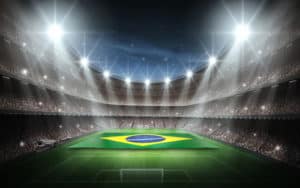

 Soccer is the world’s game, and just about every even halfway-developed country on earth has some form of domestic league.
Soccer is the world’s game, and just about every even halfway-developed country on earth has some form of domestic league.
MLS has emerged as a viable American league, while the Premier League in England, Bundesliga in Germany, La Liga in Spain and Serie A in Italy are some of the other elite leagues around the world.
What about competitions? In addition to their respective seasons, most major leagues around the world hold cup tournaments along the way. Clubs will also compete in international cup competition, such as UEFA Champions League and Europa League. We also have major international team competitions, such as the FIFA World Cup, UEFA Euro and Copa America.
The World Cup is an international soccer tournament consisting of men’s and women’s national teams. The competition takes place every four years, with the next set to occur in Russia in 2018. Germany won the last men’s World Cup in 2014, while the United States won the women’s event in 2015.
 Team from all over the world play against each other during the qualification phase. Each regional federation of FIFA will send a certain number of teams to the 32-team tournament. The tournament is hosted by a different country every time, to be determined by a vote by the FIFA Council.
Team from all over the world play against each other during the qualification phase. Each regional federation of FIFA will send a certain number of teams to the 32-team tournament. The tournament is hosted by a different country every time, to be determined by a vote by the FIFA Council.
The home nation’s team is automatically granted qualification into the 32-team field. So, Russia will not need to qualify for the 2018 men’s tournament.
The other 31 teams will be decided between the six FIFA regional zones (Africa, North and Central America and Caribbean, South America, Oceania, Europe, Asia). Beforehand, FIFA determines how many teams each confederation will get into the tournament based on the respective strength of the confederations’ teams.
As for the tournament itself, the 32-team field will first play a group stage. The teams are divided into eight groups of four teams. The top two teams in each group will advance beyond the group stage to the knockout stage after a round robin style in which each team in a given group plays every other team once.
Advancement is determined by a points system. Teams will be awarded three points for a win, one point for a draw and no points for a loss. The two teams with the most points at the end of the group stage advance. If a tiebreaker is needed, that is determined by:
The knockout stage is more simple. Whichever team wins a game in the knockout stage will advance. If both teams remain tied after 90 minutes, extra time and eventually a penalty shootout will be used to determine a winner.
The men’s World Cup has taken place 20 times, and Brazil’s five tournament wins are the most of any country all-time. Germany and Italy have each won four apiece, while Argentina and Uruguay are the only other multiple-time winners, with two.
Brazil, Italy, France and Mexico have each hosted the World Cup twice. The United States, who has never won the men’s World Cup, has hosted once, in 1994.
As one would imagine, the World Cup is a massive draw for audiences and television viewers alike. More than one billion people reportedly tuned in for the 2014 final between Germany and Argentina, with the tournament as a whole drawing an estimated 3.2 billion viewers worldwide.
More than 280 million people reportedly watched games throughout the tournament online or via mobile devices, as well. The 2014 final drew a 12 percent increase in viewership from the 2010 final between Spain and the Netherlands.
Nearly 35 million people in Germany tuned into the 2014 final alone. Considering the country consists of 80 million people total, that gives you a good idea of how popular the competition is.
 While the World Cup pits national teams against one another in an attempt to crown the world’s best, the UEFA Champions League is a club competition that pits Europe’s top clubs against one another.
While the World Cup pits national teams against one another in an attempt to crown the world’s best, the UEFA Champions League is a club competition that pits Europe’s top clubs against one another.
Formatting for UCL is similar to the World Cup. As of now, 32 teams qualify for the group stage, which has the same rules as the World Cup. Clubs will advance all the way to the two-team final, which will be played at a predetermined neutral venue. Unlike the World Cup, Champions League takes place on an annual basis.
The knockout stages are slightly different than in the World Cup, however. Rather than the winner being determined by one head-to-head matchup, teams will play each other twice, with one game at each team’s respective home stadium. Whichever team scores more goals across the two legs will advance.
If the teams scored the same number of goals, the team that scored more goals as the away team will advance.
Teams that qualify for the UCL are the best of the best within the respective domestic leagues. For example, the teams that finish the English Premier League season ranked one through four automatically qualify for next season’s Champions League.
Not every country gets four teams into the tournament, of course. The number of teams that each country will enter into the tournament is based on that country’s UEFA coefficient. The coefficient takes into account each association’s performance in European competitions over the last several years.
Spain, Germany, England and Italy have been the countries with the strongest coefficients in recent years. France, Russia, Portugal and Ukraine have not fared as well, but still typically get at least two clubs into the UCL.
Spanish side Real Madrid have won the most Champions League trophies all-time, with 11. They have also finished as runners-up another three times. Italian club AC Milan has won seven times, while Germany’s Bayern Munich, Spain’s Barcelona and England’s Liverpool have won the competition five times apiece.
The only other clubs to have won Champions League on multiple occasions are Inter Milan (three), Manchester United (three), Ajax (four), Juventus (two), Benfica (two), Nottingham Forest (two) and Porto (two).
Cristiano Ronaldo, who has played in the tournament with both Real Madrid and Manchester United, has scored a record 95 goals in Champions League. His chief rival, Barcelona’s Lionel Messi, is nipping at his heels, with 94. Those two are far ahead of the rest of the field. Former Real Madrid and Schalke man Raul ranks third all-time, with 71 goals.
Spanish goalkeeper Iker Casillas has played in more Champions League game than any other player, with 162 appearances. Former Barcelona midfielder Xavi is second with 151, while former Manchester United midfielder Ryan Giggs made 145 appearances.
Current Manchester United striker Zlatan Ibrahimovic has made 119 UEFA Champions League appearances with a record six clubs, not including his current team.
 UEFA’s Euro competition is essentially a European version of the World Cup. Rather than pitting teams from all over the world against one another, this tournament is exclusive to teams in Europe, as you may have gathered already.
UEFA’s Euro competition is essentially a European version of the World Cup. Rather than pitting teams from all over the world against one another, this tournament is exclusive to teams in Europe, as you may have gathered already.
This competition was founded in 1960, and also occurs once every four years. For the most recent tournament, in 2016, UEFA decided to expand the field to 24 teams for the first time. Previously, 16 teams played in Euro. While there have been rumors that the field may expand even further, no action has been taken as of yet.
Qualifying for Euro is similar to qualifying for the World Cup. The qualifying phase begins in the fall immediately following the preceding Euro tournament. For the final tournament, teams are grouped into six groups of four teams.
The top two teams in all six groups advanced beyond the group stage, with the four best third-place teams also advancing. Teams advance from the group stages based on the same points system that the World Cup uses: three points per win, one point per draw, no points per loss.
The knockout stages are the same format as the World Cup, as well. Two teams will face-off just one time, with the winner moving on.
Germany and Spain have eached claimed the most Euro titles, with three apiece. Germany last won in 1996, while Spain most recently claimed the top prize in 2012. Germany has also been runner-up three times. France is the only other country to have won this tournament on multiple occasions.
Portugal won Euro for the first time by shocking host country France in the final. The 2016 tournament set viewership records all over Europe and in the United States, as well. Nearly six million people tuned in for the aforementioned final between France and Portugal in the USA, which was up two percent from the 2012 final.
More than 300 million people worldwide watched the final.